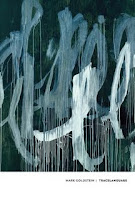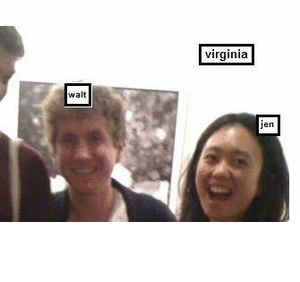Ventrakl by Christian Hawkey

One of the more interesting books of 2010 in general, Hawkey's writings-through/with/around the notoriously hermetic verse of Austrian poet George Trakl takes Jack Spicer's ideas in After Lorca, detonates them, and fills in the gaps with archival photographs, biographical information, imagined interviews, and poems that expose the originality of their "translator."
 O Resplandor by Erin Mouré
O Resplandor by Erin MouréOne of Christian Hawkey's favorite books of the year, this work by Canadian poet Erin Mouré accomplishes the same feat as her Sheep’s Vigil by a Fervent Person—in which she adds another persona to Pessoa's retinue, setting the original Portuguese against a specifically North American-based English. Here, she takes on the work of numerous poets and poems—with titles, charmingly enough, like "The Paul Celan Translations by Erín Moure." Read an interview with Erin >
Tracelanguage by Mark Goldstein

More Bookthug Publishing here. More Celan here—and, at the same time, less of it. Mark Goldstein's second collection of homophonic translations from the German (his last being After Rilke) removes Celan in order to replace him with a series of short lyrics—what Goldstein calls "a transtranslation"—infested with the ur-poet.
 5 Meters of Poems by Carlos Oquendo de Amat, translated by Alejandro de Acosta and Joshua Beckman
5 Meters of Poems by Carlos Oquendo de Amat, translated by Alejandro de Acosta and Joshua BeckmanThe original poems being a critical avant-garde text from the Peruvian modernist, pair that with Beckman's playful sense of the lyric and Ugly Duckling's gorgeous accordion-foldout printing, and you get a beautiful example of why reappropriation/translation is the key to all poetic growth.
 The Dickinson Composites by Jen Bervin
The Dickinson Composites by Jen Bervin I haven't been able to fork up the $2,000 to get a hold of one of these titleless boxes of Emily Dickinson's punctuation marks sewed into quilts and documented herewith, but it's clearly one of the more interesting transcreations of the year—the unpublished become the nearly unpublishable published (by Granary Books).
 The Microscripts by Robert Walser, translated by Susan Bernofsky
The Microscripts by Robert Walser, translated by Susan BernofskySpeaking of the unpublishable, these densely packed texts were written on strips of paper in a shorthand less than 2 millimeters high, presumed to be undecodifiable until an insane critic came in and unraveled the code. Bernofsky unravels them further into the short poem-stories they are and are not.
Meddle English by Caroline Bergvall

Selected works are tricky, but Bergvall's oeuvre is so expansive that it invites this sort of wrangling for the purposes of new readers of this seminal, yet still in many ways overlooked, conceptual poet. Her abbreviated versions of Chaucer's Canterbury Tales would make you run to get the original if they weren't so transfixing in their own rite. But there's more, and then more than that.
 Johnny 23 by Charles Burns
Johnny 23 by Charles BurnsWhen I asked Charles Burns to sign my copy of this limited edition copy of Johnny 23 written in Alien script at the Brooklyn Comic-Con, I called it a translation, and he specifically said it wasn't. Nonetheless it belongs on this list. Whether you're an avid fan of children's cereal/boy-girl-scout decoders or not, there's still a distinct pleasure to be derived from invented nerd-languages. And the draftsmanship is typically amazing.
 The Book of Genesis by R. Crumb
The Book of Genesis by R. Crumb"It's hard to draw God," says the famed illustrator R. Crumb regarding his recent adaptation of the Bible. If the original text didn't strike the fear of the grand creator into you, then this comic-master's black and white sketched version will catch you up on why the God of the Jews is the dark source of beauty itself. Technically, this is a late 2009 publication. Whatever—it's timeless.
 A Hemingway Reader by Robert Fitterman
A Hemingway Reader by Robert FittermanThough Rob the Plagiarist was published in 2009 as well, Fitterman recently republished it, along with the rest of his collected works, on his website. "A Hemingway Reader" was in said book, but here it is on its own—in all its compiled-Hemingway-sentences-from-The-Sun-Also-Rises-that-begin-in-the-first-person glory. The above link is a .pdf, so put it on your iPad and get ready for the future of literature.






